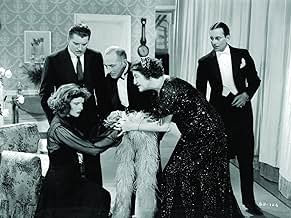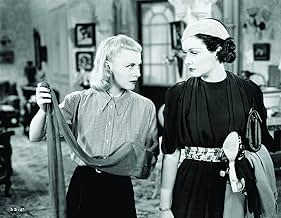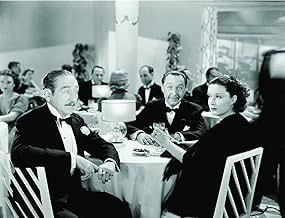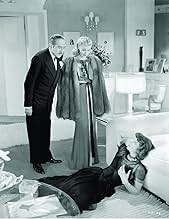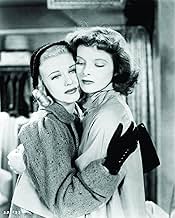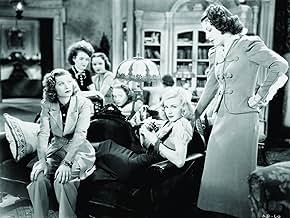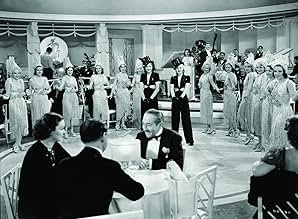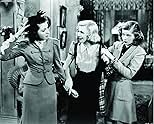AVALIAÇÃO DA IMDb
7,7/10
9,6 mil
SUA AVALIAÇÃO
Adicionar um enredo no seu idiomaA chronicle of the ambitions, dreams, and disappointments of aspiring actresses who all live in the same boarding house.A chronicle of the ambitions, dreams, and disappointments of aspiring actresses who all live in the same boarding house.A chronicle of the ambitions, dreams, and disappointments of aspiring actresses who all live in the same boarding house.
- Direção
- Roteiristas
- Artistas
- Indicado a 4 Oscars
- 5 vitórias e 5 indicações no total
Avaliações em destaque
New York City. The Footlights Club is a theatrical boarding house where young women wait for the chance to make it big on Broadway. To deal with the disappointment & bitterness that can set in, they engage in wisecracks & gossip. Fiercely loyal to their friends, they can be wickedly spiteful to those that cross them. Always before them is their dream - to capture elusive success at the STAGE DOOR.
A wonderful film, fresh & sparkling, with great dialogue infusing its wit & drama. The rapid-fire cross talk is still a real treat for viewers - as is the chance to see several fine young actresses early in their careers.
The entire cast is excellent. Brash Katharine Hepburn is the new girl who quickly meets the `regulars': feisty Ginger Rogers, cynical Lucille Ball, wisecracker Eve Arden, lively Ann Miller, snobbish Gail Patrick & sweet Andrea Leeds. While the young ladies certainly get most of the attention, be sure not to overlook Constance Collier, terrific as Miss Luther the has-been actress. Growing old on bittersweet memories, she is a constant reminder to the others what, even with success, they still might become.
Adolphe Menjou gives his usual vivid performance as an immoral producer, while Samuel S. Hinds is good as Hepburn's father. Film mavens will enjoy spotting several familiar faces in uncredited roles: Jack Carson as a Seattle lumberman; Grady Sutton as a butcher's helper; Frank Reicher as a stage director; Franklin Pangborn, hilarious as a butler; and Ralph Forbes in the role of Hepburn's stage spouse.
A wonderful film, fresh & sparkling, with great dialogue infusing its wit & drama. The rapid-fire cross talk is still a real treat for viewers - as is the chance to see several fine young actresses early in their careers.
The entire cast is excellent. Brash Katharine Hepburn is the new girl who quickly meets the `regulars': feisty Ginger Rogers, cynical Lucille Ball, wisecracker Eve Arden, lively Ann Miller, snobbish Gail Patrick & sweet Andrea Leeds. While the young ladies certainly get most of the attention, be sure not to overlook Constance Collier, terrific as Miss Luther the has-been actress. Growing old on bittersweet memories, she is a constant reminder to the others what, even with success, they still might become.
Adolphe Menjou gives his usual vivid performance as an immoral producer, while Samuel S. Hinds is good as Hepburn's father. Film mavens will enjoy spotting several familiar faces in uncredited roles: Jack Carson as a Seattle lumberman; Grady Sutton as a butcher's helper; Frank Reicher as a stage director; Franklin Pangborn, hilarious as a butler; and Ralph Forbes in the role of Hepburn's stage spouse.
10zetes
I don't quite know how to put my passion for this film into words. It's something I never expected. I taped it off of television because I've been on a Ginger Rogers kick lately (I think I'm in love with her), and very luckily experienced something of enormous quality.
There is not a regular plot. Unlike most classical cinema, the goal towards which the film is striving is quite tenuous. Basically, the goal is for Katherine Hepburn to get a part in a play and give a good performance, but it is never stressed. Instead, what we get is more of an ensemble piece. There are characters who are more central than others, but we get to know well a great number of characters. And we live with them, experience their dreams, hardships, and successes, falling more and more deeply in love with them every minute, caring about them as we would dear friends or siblings.
It is most often referred to as a comedy, and the dialogue tends to be hilarious (Ginger Rogers is in full form here, wisecracking at the speed of light), but the film's drama is very affecting, too. This film's ending is so beautiful, and like all great films, we're reluctant to say goodbye to the characters. Fortunately, since I have it on tape, I can visit the boarding house any time I want. Unfortunately, since this film is neither on VHS nor DVD, you probably cannot. Watch for it on AMC or TCM or other stations that play classic films. You will not be disappointed. 10/10
There is not a regular plot. Unlike most classical cinema, the goal towards which the film is striving is quite tenuous. Basically, the goal is for Katherine Hepburn to get a part in a play and give a good performance, but it is never stressed. Instead, what we get is more of an ensemble piece. There are characters who are more central than others, but we get to know well a great number of characters. And we live with them, experience their dreams, hardships, and successes, falling more and more deeply in love with them every minute, caring about them as we would dear friends or siblings.
It is most often referred to as a comedy, and the dialogue tends to be hilarious (Ginger Rogers is in full form here, wisecracking at the speed of light), but the film's drama is very affecting, too. This film's ending is so beautiful, and like all great films, we're reluctant to say goodbye to the characters. Fortunately, since I have it on tape, I can visit the boarding house any time I want. Unfortunately, since this film is neither on VHS nor DVD, you probably cannot. Watch for it on AMC or TCM or other stations that play classic films. You will not be disappointed. 10/10
Something very sinister happened to movies between 1937 and the 1950s that made this kind of film impossible to make. It's a terrific example of ensemble acting, with no one taking a back seat to anyone else. Ginger Rogers is absolutely amazing, especially after seeing some of the fluffy stuff she did with Astaire. It's hard to believe this is the same actress.
The dialogue zips along with lighting speed including some great laugh-out-loud one-liners. What a wonderful script! Very much like "Grand Hotel" in its structure and shockingly adult themes.
The relationships between all the women are so complex it's hard to believe it was actually made when it was. It makes men look very bad - at best we're imbeciles, at worst, Svengalis. And it has the same kind of uneasiness and disillusionment with the theater that "Sunset Boulevard" had with the movies. I wish there were more like it.
The dialogue zips along with lighting speed including some great laugh-out-loud one-liners. What a wonderful script! Very much like "Grand Hotel" in its structure and shockingly adult themes.
The relationships between all the women are so complex it's hard to believe it was actually made when it was. It makes men look very bad - at best we're imbeciles, at worst, Svengalis. And it has the same kind of uneasiness and disillusionment with the theater that "Sunset Boulevard" had with the movies. I wish there were more like it.
In fact this film version of a stage play by Edna Ferber and George S Kaufman, directed by Gregory La Cava is 70 years old and although it may show a wrinkle here or there - like having Adolph Menjou as the romantic lead - the youthful energy in the acting and dialog has surfed the waves of time unscathed. The bunch of girls populating the Footlights lodgings is a smashing crowd. Katharine Hepburn, brisk and Hepburnish already to the hilt. Ginger Rogers drinks, scratches and dances a duet with Ann Miller. Eve Arden, as usual, delivers the best one liners and Lucille Ball seems ready for a startling career. Andrea Leeds got an Oscar nomination and Constance Collier plays an over the hill actress that becomes Hepburn's minder, just like in real life. The film moves at an incredible speed and I defy you not to tear up when Hepburn makes her entrance with the Calla Lillies in bloom.
8sol-
A very well acted classic drama with great characters that interact realistically when together, it is also supported by some fine acting. Katharine Hepburn is very strong and natural, and Ginger Rogers matches her, playing a witty and almost cynical character very well. Gail Patrick is great too, yet Andrea Leeds was the only cast member to go on to receive an Academy Award nomination, however she is the best of the bunch, giving life to a frail and emotionally unstable aspiring actress. It is a bit overly talkative, and it has at least one too many subplots going on, however the film presents such an interesting insight into the lives of wannabee actresses that these points hardly matter. It is indeed a little difficult to distinguish each of the supporting characters as individuals, and perhaps they could done with further development, but yet this factor is very much like how all the aspiring actresses in the world are: indistinguishable, until you get to know them - and how actresses get ahead in the world is a lot of what this film is about. The final few minutes of the film could have been chopped out; otherwise this is good viewing all the way through.
Você sabia?
- CuriosidadesWhen Katharine Hepburn delivered her climactic stage speech, Gregory La Cava reduced it to only ten lines and filmed it on a closed set. He later brought in the actors and the extras in the audience and had them react to the filmed speech. Many of them broke down.
- Erros de gravaçãoThe band at Club Grotto, where Jean and Annie perform a dance number, includes a female vocalist who can be seen singing in the background, but no vocals are heard on the soundtrack.
- Citações
Terry Randall: [delivering her opening speech in the play within the movie] The calla lilies are in bloom again. Such a strange flower, suitable to any occasion. I carried them on my wedding day and now I place them here in memory of something that has died.
- Versões alternativasSPOILER: A shot of a man mowing the grass around Kay's grave is missing from some versions.
- ConexõesEdited into Starring Katharine Hepburn (1981)
- Trilhas sonorasPut Your Heart Into Your Feet and Dance
(uncredited)
Written by Hal Borne and Mort Greene
Danced by Ginger Rogers and Ann Miller
Principais escolhas
Faça login para avaliar e ver a lista de recomendações personalizadas
- How long is Stage Door?Fornecido pela Alexa
Detalhes
- Data de lançamento
- País de origem
- Idioma
- Também conhecido como
- Entre bastidores
- Locações de filme
- Empresa de produção
- Consulte mais créditos da empresa na IMDbPro
Bilheteria
- Orçamento
- US$ 952.000 (estimativa)
- Faturamento bruto mundial
- US$ 8.835
- Tempo de duração
- 1 h 32 min(92 min)
- Cor
- Proporção
- 1.37 : 1
Contribua para esta página
Sugerir uma alteração ou adicionar conteúdo ausente


